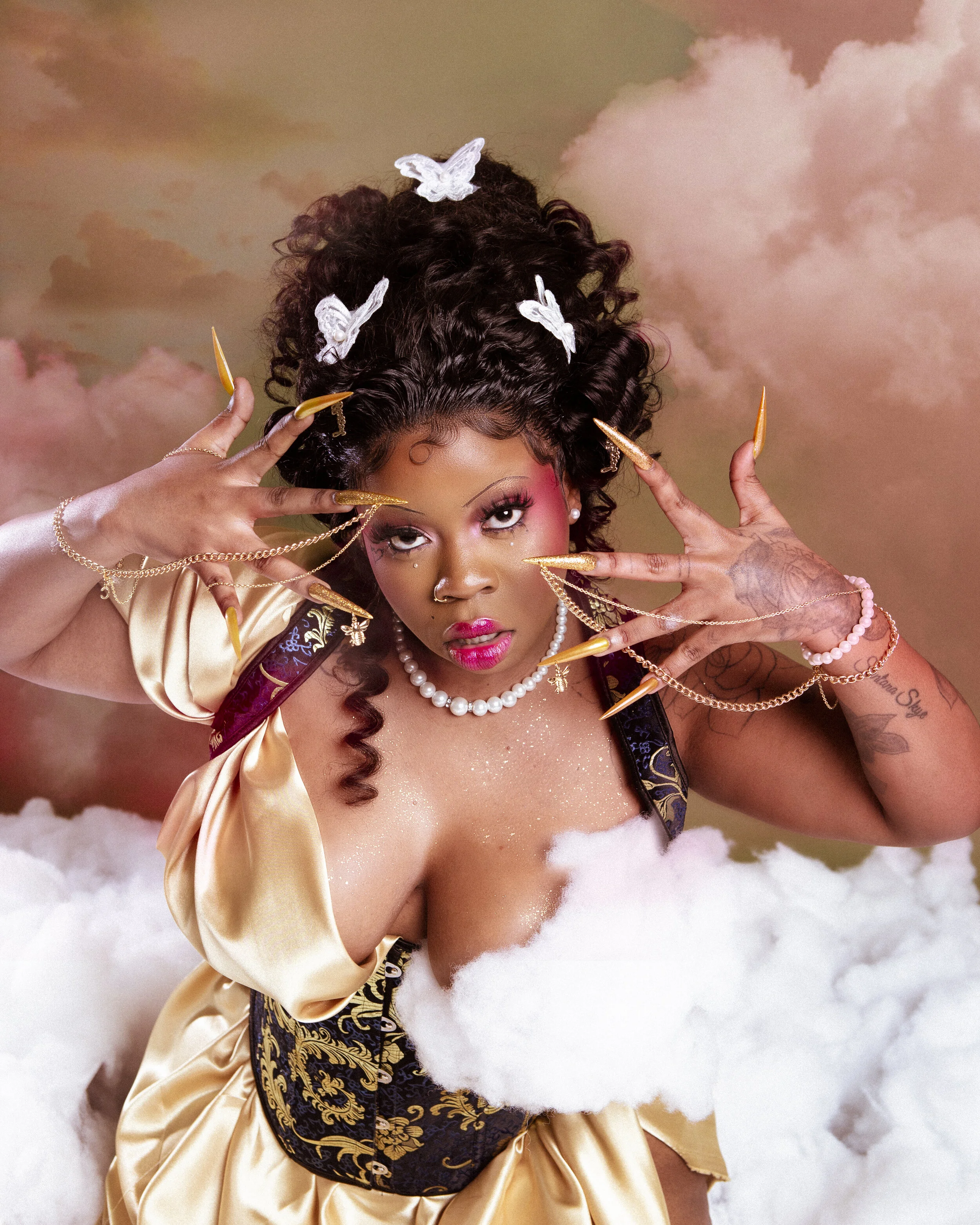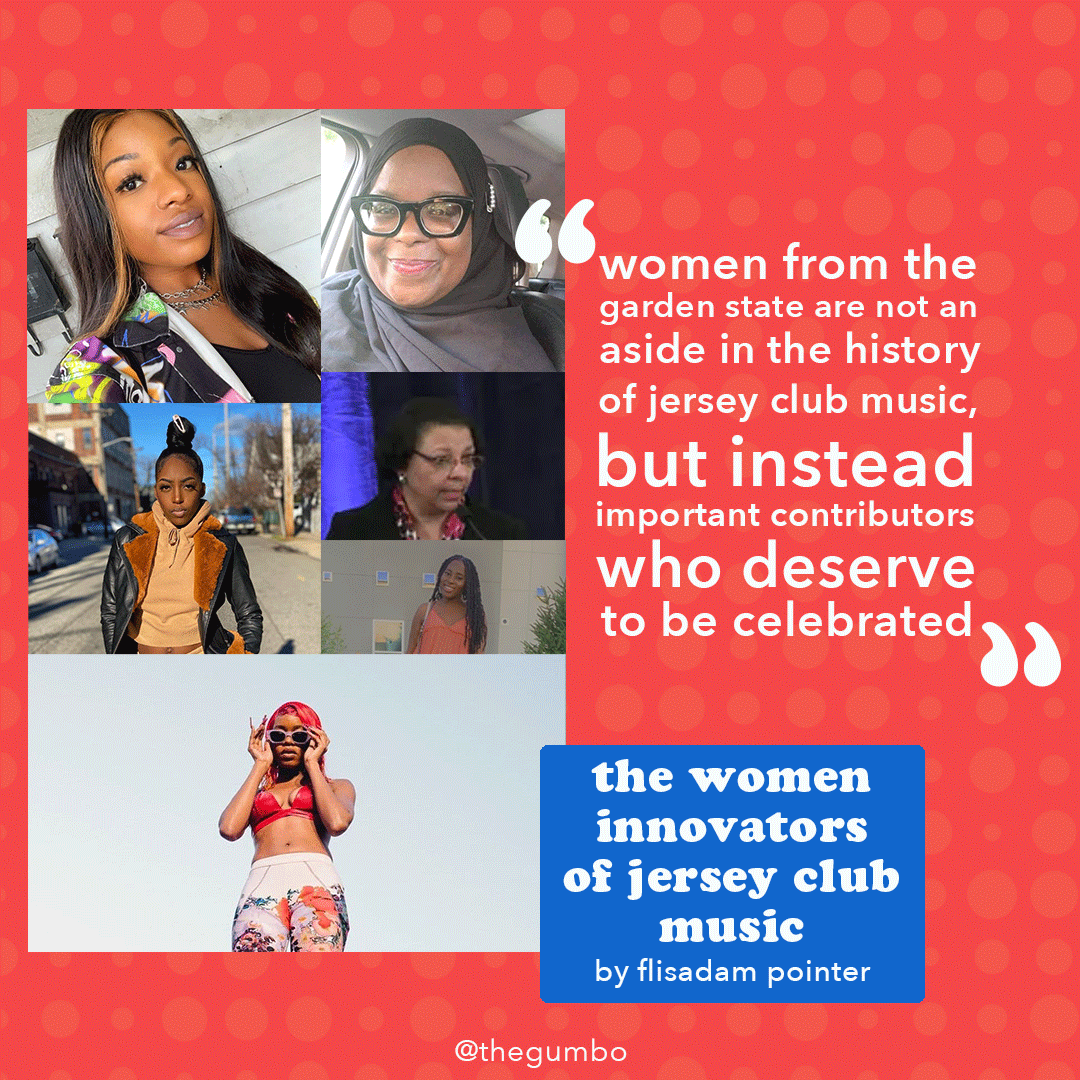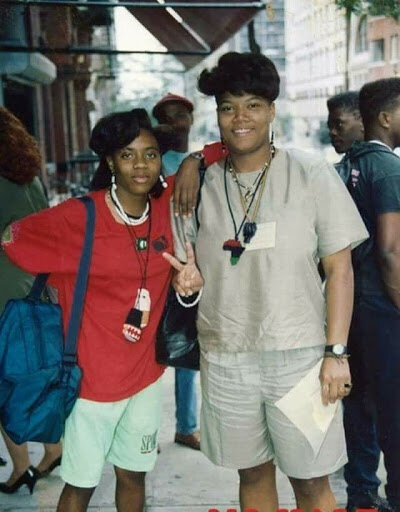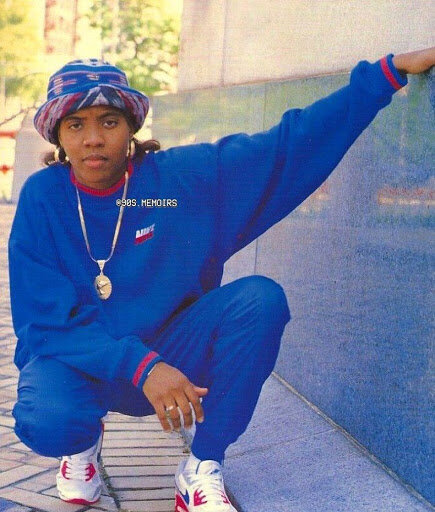by Nadirah Simmons
Zimbabwe born, Toronto-raised rapper Charmaine is a woman to watch out for. In 2020 she released her debut single “BOLD," which now sits at 1.9 million streams and has earned cosigns from Ebro Darden on Apple Music 1, the legendary Fatman Scoop and COLORS Studios. Additionally, Complex named Charmaine as an artist to watch in 2021, she’s been tapped as a Spotify RADAR artist and just a few weeks ago she was selected as a First on SoundCloud artist which highlights musicians from across the globe, even celebrating the announcement on IG Live with Rico Nasty. We caught up with her last week on IG Live to talk about her success, her debut EP HOOD AVANT-GARDE which is out today, women in rap who inspire her and more.
The Gumbo: Your latest single “WOO!” is the follow-up to “BOLD,” which released this past Fall and now sits at 1.9 million streams. You’ve been co-signed by Ebro on Apple Music 1, Fatman Scoop, COLORS Studios, and then this week you’ve been named one of the ten artists to watch for in 2021 by SoundCloud. You are out here!
Charmaine: I’m tryin’, I’m tryin’! [Laughs]
How does it feel to release your debut single in a pandemic and get 1.9 million streams? That is...wild.
It is very wild. I believed in the record and it was definitely my first choice to debut it. But, I had no idea that I would get the kind of response I got, especially now. So, I’m just really humbled by the fact that everyone’s fucking with it like that. I’m just like, “Ok, I mean, maybe I did something now! Maybe I did something!” [Laughs]
I feel like oftentimes, over here in the States, everyone kind of looks at [Canada] like, “Oh my God! Canada, there’s Drake and there’s all these different things that are happening over there.” Talk to me a little bit about the music landscape in Canada and how it shaped you and your sound.
Canada has some amazing artists. That’s bottom line. So many talented people are over here. Of course we have the Drakes, and The Weeknd, the Biebs, you know what I mean? But I feel like a lot of, like, the really dope artists are not given the platform or the spotlight that they need and that’s something that I really would like to change. Because I feel like if people actually got the backing and the opportunity to showcase themselves, we’d have so many more Canadian artists blowing up, and I don’t understand why yet. I’m hoping that’ll change in the future but, yeah. [Laughs]
Look, I love that...I wanna know, when did you know that you wanted to rap and enter this space?
Ok, so this was a complete accident! It wasn’t pre planned, it wasn’t thought out. One day, I was in the studio with my production team. We already had finished the songs that we were supposed to finish for that period. And we had a couple more tracks left to do, and one day I just walked in and my producer was like, “Yo, you wanna try rapping?” I was like “...Yeah, sure. [Laughs] I guess.” I’ll try anything once, because you never know. It could work, it could not. I don’t really care, but it just happened to work and it happened to work a lot better than I expected it to. I feel like I actually love rapping way more than I love singing now, which is kind of crazy but it was a complete accident. It was a complete accident. [Laughs]
And now we have “Woo”, and I just wanna say the opening of “Woo” is so explosive:
“Yeah, he know he just a number and he’s cool with that.” What was your thought process when creating this particular song?
Honestly, I was just really missing going out with my friends and going out to clubs and just enjoying music as a whole. So, I just wanted to make a record that sounded like that. That gave me that same feeling that I would get when I would go out with my girls. On top of that, just kind of mocking men and, you know, just having my way with them and doing whatever I want and it’s just kinda like...if you don’t give me what I want, when I want it, how I want it, I will find somebody else to do it. But, in the meantime, I will be partying with my girls. [Laughs] You know what I mean? That’s really how that one came around.
Between the lyrics in your songs and some of your previous interviews that I’ve watched, you really are standing so firm and tall in your autonomy and represent for Black women, letting us know that we can do whatever we want, we can act however we want, and we’re not worried about what someone might say or think about how we need to be presenting ourselves. Has that been something at your core you knew had to be in your music?
Oh, 100%. You know, it took me a while to get the place that I’m at right now within myself and you know, growing up we’re always told we have to fit this certain mold. We can’t talk too loud or we can’t have our hair too bright, we can’t do all these things and then, just like, who said that? Nobody said that. That’s not a written rule or a law. I refuse to abide by that and I just want other Black women to feel the same way. We don’t gotta do shit anybody tells us. We can do whatever the fuck we want and you can either take it or leave it but we’re not gonna change ourselves to conform to whatever imagery or idealistic concept you think we should be.
Absolutely, I love that! I want to move on and talk about your debut EP [HOOD AVANT-GARDE]. Tell me more about it.
So, the whole concept of this EP was just to redefine what it is to be a renaissance woman. Typically, you see imagery, like, you see this white man in the middle of everything as like the leader, the power, the hero, the person who’s doing everything, you know, great. And everyone around him, especially the women are being subjected in some type of way or objectified and I was just like, “Nah, what can we do to redefine this?” So, what we did is take that concept and flip it. Now, it’s about women being in the forefront, it’s about a powerful woman being in the forefront and in the center. It’s about redefining what it means to be a renaissance man...Nobody has heard anything like this before and we took our time to make sure that every record was perfect, from the instrumentation to the lyricism to the cadences. Every little element is so thought out and I feel like the world is really gonna respond well to it.
Now, I wanna switch gears a little bit. I feel like I know what you’re gonna say ‘cause I was reading all of your stuff, so I might already know the answer to this. But, I wanna know: who are some women in rap that you look up to?
You already know what I’m gonna say for sure! [Laughs] Cause I’m kind of giving her vibes right now, so definitely, hands down, Missy Elliot by far. [Laughs] And I think, at this point, it’s evident and people are picking up on that and, I don’t know, there’s just something about the way that she’s creative and she’s not afraid to push the envelope. She plays around with her appearances. The visuals are crazy, the talent is crazy, the production is crazy, like, she is just a legend in my books, and I’m pretty sure in anybody else’s book. If not, you trippin’! [Laughs] So, hands down Missy. I mean I also have other inspirations such as Lil’ Kim, Da Brat, Queen Latifah, Foxy Brown. And, like I also draw influences from southern rap, like Lil Jon & The East Side Boyz, Lil Scrappy, Dem Franchize Boyz. So, like, it’s a whole mixture of a lot of things going on. [Laughs]
Another question that I wanted to ask is: what advice would you have for younger Black women who are looking to get into rap?
I think it’s as simple as just start. Start! Don’t be afraid of failure because you only grow from failure and then you can adjust as you go along and try different things. But just start. Don’t be afraid to be yourself. Don’t be afraid to walk into rooms and into spaces and demand your respect because you deserve that respect. And, you ain’t gotta listen to anybody who has anything negative to say about you! Honestly, just focus on the people who are supporting you. Focus on the people who are speaking life into you and bringing that positive energy into you and I promise you the opportunities will just start to come to you. But, definitely have confidence in yourself. Understand that you’re a bad bitch and you are talented and you can reach big levels, you just gotta put your mind to it.
How do you prioritize self care in the midst of making music and recording videos and just working?
I’m working on it! [Laughs] I’m not the best at doing that right now. I’m trying to. What I have been doing lately, though-like, it sounds terrible but it’s completely fine with me. I’m ok with a little toxicity in my life-whenever I’m not working I’m probably just watching Netflix, eating Captain’s Boil like I don’t care. [Laughs]
What’s Captain’s Boil? Is that seafood?
Yup!
Ok, hold on, timeout! I love seafood boils. Where is this at? Like, this is in Toronto? Where?Yeah, there’s multiple. Like, there’s a lot of different locations around the city and the GTA. Thankfully there’s one that delivers close to my house. There’s one that delivers close to my brother’s house and I’m usually at either/or place. So I just be ordering me some shrimp, you know what I’m saying? Some crab legs, a little seafood fried rice [Laughs] And just binge watching Netflix.
Yo, can I tell you at the beginning of the pandemic...all of my friends know, like I have a problem. Everyday I’m like, “Y’all wanna get a seafood boil?” They’re like, “Nadirah, no. We’re not going every single day!”
I wish somebody would tell me to stop eating it! Like, no. I would rather cut you off than to cut out the seafood boil. Like, no.
[Laughs] Well I’m super duper excited for your project and I am gonna finish off with a question that we ask everyone that we talk to, which is, “When did you fall in love with hip-hop?”
I fell in love with hip-hop when I saw Lil’ Kim’s “Jumpoff” and heard Lil’ Kim’s “Jumpoff” video. I mean, I was too young to be listening to that anyway, but I was in the living room like [hums “Jumpoff”]. I was like, “Yo, why is this so fire?” [Laughs] Yeah, so from then on…
Listen HOOD AVANT-GARDE here: https://charmaine.lnk.to/hoodavantgarde























